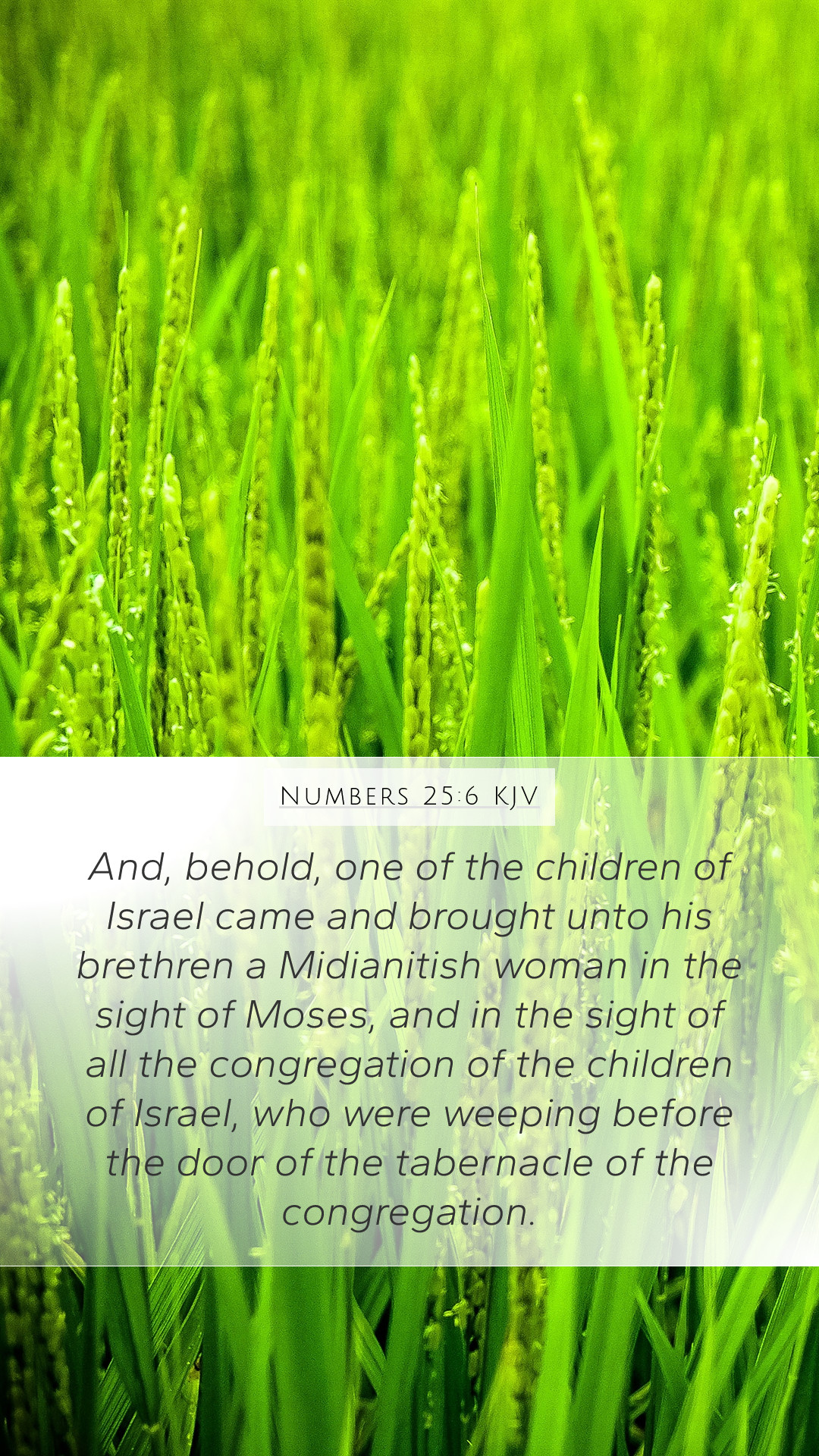Understanding Numbers 25:6
Numbers 25:6 states:
“And behold, one of the children of Israel came and brought unto his brethren a Midianitish woman in the sight of Moses, and in the sight of all the congregation of the children of Israel, who were weeping before the door of the tabernacle of the congregation.”
Overview of the Verse
This verse describes a disturbing incident during the Israelites' journey in the wilderness. A man from the tribe of Israel boldly brings a Midianite woman before Moses and the congregation, which causes great distress among the people.
Commentary and Insights
Combining wisdom from various public domain commentaries, we can derive the following insights:
- Matthew Henry's Commentary:
This commentary highlights the audacity of the Israelite in bringing the Midianite woman to the camp, directly challenging the holiness expected among God’s people. Matthew Henry emphasizes the danger of intermarriage with foreign nations, particularly those who do not worship Yahweh. This act serves not only as an affront to Moses but also as a blatant disregard for the commands of God regarding purity and separation.
- Albert Barnes' Notes on the Bible:
Barnes elaborates on the implications of this event, stressing the importance of maintaining a distinct identity as God’s people. He notes that the situation illustrates a broader theme in Scripture about the consequences of mixing holy and unholy influences. This act ignites God's anger and leads to severe consequences for the Israelites.
- Adam Clarke's Commentary:
Clarke notes the significance of the public nature of this sin, as it was done openly before Moses and the congregation. He points out that the demonstrative display not only provoked God's wrath but also invited judgment upon the community at large. Clarke highlights the weeping of the congregation as an expression of their sorrow over sin and impending judgment, a theme that resonates throughout the Bible.
Historical Context
To fully grasp the meaning of Numbers 25:6, it's essential to consider the historical context:
- The Israelites were nearing the end of their wilderness journey and had faced numerous trials and temptations.
- God had previously instructed them to avoid relationships with the peoples surrounding them, specifically those who practiced idolatry.
- This incident occurs shortly after God had demonstrated His anger with the Israelites for their previous idolatry at Peor, making the man’s actions even more provoking.
Biblical Exegesis of the Verse
In analyzing the verse, we can observe several key themes:
- Defiance Against God’s Command: The act described represents a clear violation of God’s law, reflecting a broader struggle of the Israelites to remain faithful amidst external temptations.
- Consequences of Sin: The boldness of the sinner seems to indicate a hardened heart, a theme echoed in various parts of Scripture where sin leads to communal judgment.
- Public Sorrow and Repentance: The reaction of the congregation weeping signifies collective acknowledgment of sin, a vital step in seeking restoration and forgiveness.
Application for Contemporary Readers
This verse invites modern believers to reflect on their conduct, especially regarding influences from outside the faith community:
- Importance of Holiness: Just as the Israelites were called to maintain their purity, contemporary Christians are urged to lead lives that reflect God’s values and standards.
- Response to Sin: The tears of the people symbolize the importance of sorrow for sin, encouraging believers to confess and repent of their failures before God.
- Awareness of Influence: The narrative cautions against compromising actions that might lead to greater sin, emphasizing the need for discernment in personal relationships.
Cross References
Numbers 25:6 relates closely to several other passages in Scripture that shed light on similar themes:
- Exodus 34:15-16: Warns against making covenants with the inhabitants of the land.
- Deuteronomy 7:3-4: Directly instructs Israel not to intermarry with foreign nations to prevent falling into idolatry.
- 1 Corinthians 5:6-7: Paul’s instruction to the church in Corinth about the danger of allowing a little leaven to affect the whole lump, paralleling the communal effects of sin.
Conclusion
Numbers 25:6 serves as a profound reminder of the seriousness of sin and the necessity of maintaining holiness before God. The insights from various commentaries provide depth to the understanding of this scripture, encouraging thorough Bible study and reflection. This passage, alongside its related texts, offers valuable lessons applicable to today's believers on the importance of upholding God’s commands amidst a world full of distractions and temptations.


